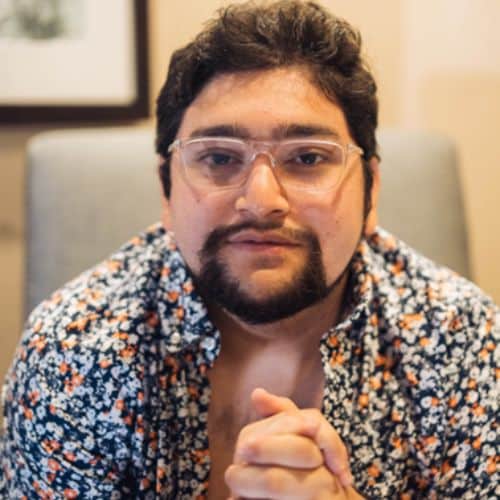Contents
Hello! Who are you?
Hi, I’m Zane Landin. I’m currently living in Mountain View, California. I lived in Washington, D.C., for a year, working for the National Geographic Society as an Internal Communications Specialist, where I was constantly communicating.
I’m passionate about storytelling and communications. Communication is crucial in addressing mental health and social justice issues and creating a community. Now, I am working for Google as an Associate Product Marketing Manager.
I am currently with someone special to my heart. We’ve been together since 2018; honestly, he’s the most amazing man I’ve ever met. I don’t have any pets here, but my family has five cats back home in California. Yep, you read that right. I thought having cats would be relaxing, but it’s a whole different story when you have five of them.
When I’m not busy working or completing a project, I enjoy writing poetry and prose, sharing my mental health journey, speaking on podcasts, cooking, baking, and gaming.
Some people think happiness is the ultimate goal, but I’m all about finding inner peace. That means accepting that we are not always happy and that life will bring new challenges. I don’t consider myself always happy. The goal should be to find inner peace and hold on to those moments of happiness because they are powerful.
💡 By the way: Do you find it hard to be happy and in control of your life? It may not be your fault. To help you feel better, we’ve condensed the information of 100’s of articles into a 10-step mental health cheat sheet to help you be more in control. 👇
What is your struggle and when did it start?
I was diagnosed with Major Depressive Disorder, and it has been quite a journey. I often experience a low mood, a lack of interest in things I used to enjoy, feelings of guilt and worthlessness, and struggles with energy and concentration. There are more symptoms someone with this condition can experience, but these are very familiar to me.
My childhood was marked by feelings of anger, depression, and anxiety, so the recent diagnosis didn’t come as a complete surprise. Thankfully, my family supported me by arranging sessions with a psychologist, which was a lifeline. Despite this help, the battle with my mental health has been ongoing.
The diagnosis I longed for finally arrived, but it didn’t bring the expected empowerment. While it sheds light on my struggles, it also serves as a reminder that this is a part of me that won’t simply vanish. Though mental health can be managed, I know it will always leave its mark. The most challenging part is not always pinpointing why I feel the way I do.
I have mixed feelings about it. On one hand, having a diagnosis helps me understand why I feel the way I do and validates my experiences. It provides clarity and a sense of direction for managing my mental health.
However, on the other hand, it also reminds me that I will likely have to deal with this for a long time. It can be daunting to think that this is a part of me that won’t just disappear. It’s a complex mix of emotions, but I’m trying to navigate it best.

How did this struggle make you feel at your worst moments?
My goal in life isn’t to reach happiness because depression inevitably prevents that. As my partner says, we should seek “moments of happiness” because a constant state of happiness is impossible to achieve. I also don’t think we should try to always remain happy because there is a spectrum of other important emotions we need to allow ourselves to feel and pass through our bodies.
There were times when it was clear I had difficulty controlling my anger. But having a psychologist helped me manage my anger better. Now, I feel more depressed and anxious than angry.
But I don’t think most people realize I am depressed and anxious. I do hide my depression, but never purposefully. When I am around people, I feel energized and absorb the in–person energy. Even now, when I mention I have clinical depression and it dampens my mood, people are shocked.
👉 Share your story: Help thousands of people around the world by sharing your own story. We would love to publish your interview and have a positive impact on the world together. Learn more here.
Was there a moment when you started to turn things around?
There was a time in university when I really struggled to maintain my emotions. I was at the lowest point in my life, so I decided to withdraw from the semester. After that, I reevaluated my life and made changes.
I would communicate how I felt with people and take more time for myself. I was very involved and felt burned out. While being involved gave my life meaning and a community, being over-involved strained my mental health.
At the time, I wouldn’t have considered myself a mental health advocate. But I redirected my depression into something meaningful. I wanted to make a difference in the mental health space because I didn’t want anyone to experience the pain, turmoil, and feeling of emptiness as I did.
Unfortunately, people will always feel these things, but if I can do my part in changing mental healthcare access, structural issues, and institutional changes, that is all that matters.
What steps did you take to overcome your struggle?
Seeing a psychologist and psychiatrist helped me the most. These professionals have the proper education to provide research-backed solutions to better my mental health.
Their support encouraged me to breathe, write down my emotions, and take medication for my condition. Meditation really helped me relax my feelings throughout the day. Still, medication supported the physiology of my brain that I can’t control.
An example of a professional helping me was when I was struggling with my body image. They told me to think about what I love about my body when I feel confronted with negative thoughts about my body.
Have you shared any of this with people around you in real life?
At this point, I am comfortable talking about my mental health with anyone. I don’t know why, but I’ve adopted the “I don’t care what anyone thinks” attitude. I am privileged to have this attitude because not everyone can be like that. If someone has an issue with my mental health background, that is someone I don’t have in my life, so it acts as a filter to the genuine people.
And I don’t blame people either because they must do what they must to protect their energy. If my story is triggering for someone, if they think that will help, more power to them.
I don’t feel comfortable sharing my mental health experience with someone who seems closed-minded. I don’t want to share personal details about my life with someone who will choose to not be sympathetic.
If you could give a single piece of advice to someone else that struggles, what would that be?
I know now my mental health will forever be more important than a job or extracurricular activity. Just like we shouldn’t sacrifice our physical health for anything, we shouldn’t do the same thing to our mental health.
While it is hard to come forward with the trauma in our story, we can hardly survive and live in pain. Unfortunately, there is a fear or shame attached to what we’ve been through, but we don’t deserve to live in it. We need to think about ourselves, and we cannot ignore our mental health.
What have been the most influential books, podcasts, YouTube channels, or other resources for you?
- Degrassi helped me realize I shouldn’t be ashamed of my mental health. At the time, it felt like the only television show discussing youth mental health.
- The National Alliance on Mental Health (NAMI) helped me learn more about how I can better my mental health.
- MTV on planning the Mental Health Youth Action Forum, an event I had the privilege of attending where I met President Biden for my work in mental health advocacy.
Where can we go to learn more about you?
I am very active on Instagram and LinkedIn.
💡 By the way: If you want to start feeling better and more productive, I’ve condensed the information of 100’s of our articles into a 10-step mental health cheat sheet here. 👇
This Cheat Sheet Will Help You Be Happier and More Productive
Thrive under stress and crush your goals with these 10 unique tips for your mental health.
Want more interviews?
Continue reading our inspiring case studies and learn how to overcome mental health struggles in a positive way!
Want to help others with your story? We would love to publish your interview and have a positive impact on the world together. Learn more here.



